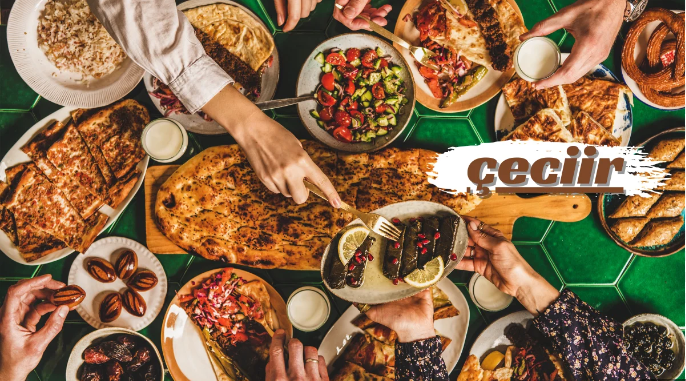Turkey has a rich cultural heritage reflected in its cuisine and traditions, capturing the attention of travellers and food lovers worldwide. Çeciir is a term that represents this authenticity, allowing you to explore the true essence of Turkish food, spices, and customs. Here, we’ll guide you through the delightful journey of Turkish cuisine, from the famous kebabs to traditional sweets, and discuss the customs that make Turkish food so inviting.
What is Çeciir?
Çeciir represents the idea of diving into traditional Turkish experiences—particularly through food. Rooted in authenticity, Çeciir emphasizes flavours, spices, and dishes that are truly Turkish, crafted with generations of knowledge and heritage. This article will explore key elements of Turkish cuisine, focusing on popular dishes, unique spices, traditional dining customs, and the role of çeciir in preserving these authentic flavours.
The Richness of Turkish Cuisine
Turkish food is well-known for its diversity and depth of flavours. Each region in Turkey has unique cooking styles and specialities, making the cuisine incredibly varied. From street food in Istanbul to homemade dishes in Anatolia, Turkish cuisine celebrates freshness and quality.
Popular Dishes in Turkish Cuisine
-
Kebabs and Grilled Meats
Turkish kebabs are world-famous. The term ‘kebab’ includes a variety of grilled meats prepared differently across Turkey. Some of the popular types of kebabs include:
- Adana Kebab: Spicy minced meat grilled on skewers.
- Shish Kebab: Cubed meats marinated with herbs and spices.
- Döner Kebab: Thinly sliced meat cooked on a vertical rotisserie.
These kebabs are often enjoyed with side dishes like pilaf, grilled vegetables, and flatbread, offering a fulfilling and flavorful meal.
-
Mezes (Appetizers)
Mezes are an essential part of Turkish dining. They are small plates served before the main course, often shared by everyone at the table. Some classic Turkish mezes include:
- Hummus: A creamy chickpea dip with tahini and olive oil.
- Ezme: Spicy tomato and pepper dip.
- Haydari: Thick yoghurt dip with garlic and herbs.
Mezes are flavorful and often feature a mix of fresh vegetables, herbs, and oils, setting the perfect tone for a Turkish meal.
-
Pide (Turkish Pizza)
Pide, often called Turkish pizza, is a flatbread with various toppings like cheese, minced meat, or spinach. It’s baked in a wood-fired oven, resulting in a crispy crust. Pide is popular across Turkey and is often enjoyed as a quick snack or a complete meal.
-
Turkish Breakfast
A traditional Turkish breakfast is a feast of flavours. It typically includes a variety of foods, such as:
- Olives: Different varieties, often marinated.
- Cheeses: Soft and hard cheeses from different regions.
- Simit: A sesame-crusted bread.
- Menemen: Scrambled eggs with tomatoes and peppers.
Breakfast in Turkey is not rushed; it’s a time to gather and enjoy various dishes with family or friends.
-
Desserts and Sweets
No Turkish meal is complete without dessert. Turkish sweets are known for their richness and use of ingredients like honey, nuts, and fruits. Popular Turkish desserts include:
- Baklava: Layered pastry filled with nuts and syrup.
- Turkish Delight (Lokum): Gel-like cubes flavoured with rosewater or fruit.
- Künefe: A cheese-filled dessert with shredded pastry and syrup.
These desserts showcase Turkey’s love for sweet treats and are often enjoyed with Turkish tea or coffee.
Traditional Ingredients and Spices in Turkish Cuisine
Turkish food is known for its flavorful spices and fresh ingredients. Some of the essential ingredients used in Turkish cooking include:
- Sumac: A tangy red spice used to add acidity to dishes.
- Paprika: A sweet or spicy powder that adds color and flavor.
- Olive Oil: Used in many dishes, especially mezes and salads.
- Pomegranate Molasses: Adds a sweet and sour flavour, often used in salads.
These ingredients are integral to Turkish cooking, giving the cuisine its distinct and aromatic profile.
Unique Turkish Dining Customs
When exploring Turkish cuisine, it’s not just about the food; dining customs are equally important. Turkish hospitality is renowned, and food is often shared in a communal setting. Here are a few customs that reflect Turkish dining traditions:
- Sharing Food: Meals are often family-style, with everyone sharing the same dishes.
- Tea Culture: Turkish tea is a staple and is served with nearly every meal.
- Slow Dining: Turkish meals are leisurely, allowing time to enjoy each dish and savour the flavours.
- Respecting Elders: At the table, it’s customary for younger people to wait until elders begin eating.
These customs emphasize respect, hospitality, and a sense of togetherness in Turkish culture, adding depth to the dining experience.
Turkish Street Food: A Burst of Flavors
Turkish street food is loved by locals and tourists alike. It’s a quick way to experience çeciir, with each bite revealing the flavours of Turkey. Some of the popular street foods include:
- Simit: A sesame-crusted bread ring, perfect for breakfast on the go.
- Dürüm: A wrap filled with kebab, veggies, and sauces.
- Midye Dolma: Mussels stuffed with rice, sold by street vendors.
These foods are easy to find in bustling markets and streets, providing a taste of Turkish culture in every bite.
Turkish Beverages: More Than Just Tea and Coffee
Turkish beverages are as unique as their food. Here are a few traditional drinks that are widely enjoyed in Turkey:
- Turkish Tea (Çay): Strong black tea served in small tulip-shaped glasses, usually without milk.
- Turkish Coffee: Brewed with fine coffee grounds, rich and aromatic.
- Ayran: A salted yoghurt drink that is refreshing and often paired with meals.
Turkish tea and coffee are symbols of hospitality and are often served to guests, making them a significant part of Turkish culture.
The Concept of Çeciir in Turkish Culture
The term çeciir encompasses not just food but the entire cultural experience. It’s about authenticity, traditions, and the Turkish people’s pride in their heritage. Whether it’s the careful preparation of kebabs, the hospitality of a Turkish home, or the flavours of street food, çeciir embodies the spirit of Turkey.
Why Try Turkish Cuisine?
If you’re looking for a culinary experience that is both diverse and rich in flavours, Turkish cuisine offers something for everyone. From the vibrant spices to the welcoming dining customs, Turkey invites you to taste, savour, and enjoy. Turkish food caters to all preferences, whether you’re a fan of meat, love vegetarian dishes, or have a sweet tooth.
- Diversity of Dishes: Turkish cuisine offers various dishes from different regions.
- Healthy Ingredients: Many Turkish dishes use fresh vegetables, grains, and lean meats.
- Cultural Experience: Every meal in Turkey reflects its traditions and hospitality.
Trying Turkish food isn’t just about tasting a meal; it’s about immersing yourself in a tradition that values family, flavour, and authenticity.
Çeciir and the Future of Turkish Cuisine
The concept of çeciir ensures that Turkish cuisine remains true to its roots even as it evolves. Modern restaurants in Turkey are now bringing traditional recipes into contemporary settings, allowing more people to experience the essence of Turkish flavours. This balance of tradition and innovation keeps Turkish food vibrant and accessible to a global audience.
Conclusion
Turkish cuisine is more than just a collection of dishes; it reflects a rich culture and history. Through çeciir, we glimpse Turkey’s heart, where every meal tells a story and every ingredient adds depth. Whether you’re enjoying a street-side kebab or a grand feast at a Turkish home, you’ll experience the warmth, authenticity, and tradition that define Turkish food.
In your journey to explore Turkish cuisine, remember that every bite represents çeciir, a connection to Turkey’s vibrant culinary heritage. Enjoy the flavours, respect the customs, and immerse yourself in a food culture that’s as timeless as delicious.







